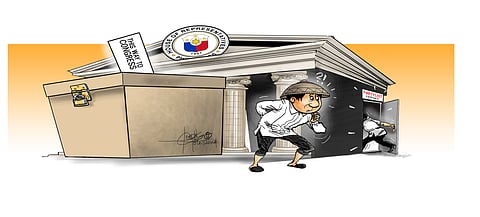
- NEWS
- the EDIT
- COMMENTARY
- BUSINESS
- LIFE
- SHOW
- ACTION
- GLOBAL GOALS
- SNAPS
- DYARYO TIRADA
- MORE

As the country prepares for another political exercise next year, the question that is expected to surface anew is: Do voters benefit from party-list representation in Congress?
Electing sectoral representatives had the goal of democratizing the membership of the House of Representatives.
Under the 1987 Constitution, Section 5 of Article VI (Legislative Department) reads: "The House of Representatives shall be composed of not more than 250 members, unless otherwise fixed by law, who shall be elected from legislative districts apportioned among the provinces, cities, and the Metropolitan Manila area by the number of their inhabitants, and based on a uniform and progressive ratio, and those who, as provided by law, shall be elected through a party-list system of registered national, regional and sectoral parties or organizations."
The House now has 316 seats; 253 of these are district representatives and 63 are party-list nominees.
The Charter also provides that: "The party-list representatives shall constitute 20 percent of the total number of representatives, including those under the party-list system. For three consecutive terms after the ratification of the Constitution, one-half of the seats allocated to party-list representatives shall be filled, as provided by law, by selection or election from the labor, peasant, urban poor, indigenous cultural communities, women, youth, and such other sectors as may be provided by law, except the religious sector."
A provision in Article IX (Constitutional Commissions/Commission on Elections) empowers and directs the Commission on Elections "to register, after sufficient publication, political parties, organizations, or coalitions which, in addition to other requirements, must present their platform or program of government; and to accredit citizens' arms of the Comelec."
The drafters of the Constitution defended the party-list provision as an equalizer since the legislature would no longer be the exclusive domain of moneyed politicians, or so they thought.
It was not long after the new Charter took effect that some opportunists realized the provision created a cheaper option to enter the House of Representatives.
The party-list system made a mockery of democracy since it did not add to the improvement of the legislature.
Chief Presidential Legal Counsel Juan Ponce Enrile, who has rendered the longest government service, said the party-list system was instituted in 1987 after the People Power revolt on the false presumption it would allow wider representation in Congress.
"We do not need the party-list representatives when every district is already represented in Congress, including all sectors in the communities of each congressman," he said.
They thought of sectoral representation through the party-list system to open Congress' door to those who should not be there, according to Enrile.
He was referring to the left-wing politicians who never won a regional election through the popular vote.
Those affiliated with the revolutionary movement, for instance, had failed to land a House seat through a direct vote in their particular districts where the New People's Army was supposedly strong,” according to the veteran public servant.
"Just consider that those who were allied with groups working for the downfall of the government are now in Congress using government resources and funds to carry out their aims," Enrile noted.
Under the Constitution, 20 percent of total House seats should be reserved for party-list congressmen who represent the marginalized sector.
Under the Constitutional scheme, voters elect not the individual but the party-list, which then designates its House representatives.
Fine-tuning the system of representation in a democratic setup was the noble goal of the party-list scheme but the intent of the Constitution to give marginalized sectors adequate representation in law-making may have been gravely compromised by loopholes in the enabling law.
Enrile cited the case of the power sector where a party-list group represents electric cooperatives.
“It looks like they have been too busy with other concerns instead of working to bring down the high power rates," Enrile said.
If the party-list system is allowed to remain, "the first order of business is to determine who are the legitimate marginalized and underrepresented sectors,” Enrile said.
Thus, Congress must take the initiative and weed out those making a mockery of the party-list law by claiming to be marginalized when the objective is merely to barge into Congress.
As it now stands, the party-list groups have grown in power to become a formidable bloc that can steer the direction of the House, which is lamentable as the elected members are now the marginalized.
